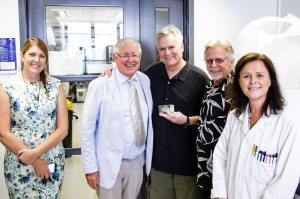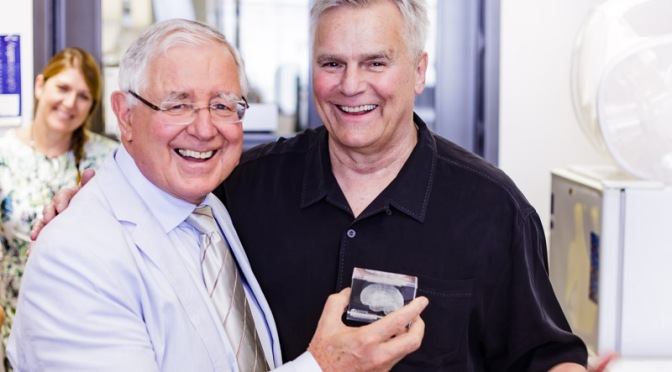
It can be a peculiar job working in communications and marketing. Most of it is writing copy for websites no one ever reads, or creating communications plans for boring products that you know are rubbish. Sometimes, however, the Gods of Marketing smile upon you and a fun gig comes along. Next thing you find yourself tootling around Auckland in your red Toyota Yaris (1.3litres of raw power) with an iconic TV star of the 80 and 90s.
So it happened that I found myself on a warm day in March ferrying MacGyver and Stargate SG1 star Richard Dean Anderson the short hop up the hill from the Pullman Hotel in Auckland City to the Centre for Brain Research at the University of Auckland Medical School. Along with us, crammed in the back of my mum car, was his road manager and good friend Paul Brown.
At the time, I was handling the media for the upcoming Armageddon Expo and Anderson was the headline star. Anderson only wanted to do a few media interviews while he was in New Zealand, but as soon as he was announced I was inundated with requests, all of them focused on his role as MacGyver – and usually some idiotic suggestion involving pocket knives and stupid stunts.
However, as Brown stressed to me, there was much more to Anderson than MacGyver and it would be great if we could find some different angles. I agreed, after all, he also starred in Star Gate SG1 as Colonel Jack O’Neil, which ran for ten seasons, he is an ardent conservationist, supporting, along with Brown, Sea Shepherd as advisors, and the river conservation charity the Waterkeeper Alliance. He is a great talent, as they say.
He and Brown also support the Art of the Brain at the UCLA Foundation, a non-profit organization, which raises money for the UCLA Neuro-Oncology Program’s brain cancer research. They were inspired to support it due to a mutual friend who had brain cancer.
This particularly twigged my interest as I had been the communications manager for the Neurological Foundation of NZ, where I had met many of the scientists now based at the Centre. My dad had died from the complications caused by a stroke during that time, so I also had a personal interest.
I put two and two together and jumped on the phone to their communications manager to see if I could arrange a private visit for Anderson and Brown. They were delighted to agree, so after a lot of email traffic between them, me and Brown it was a go.
I also organised interviews with selected media and briefed them as much as I possibly could with extensive backgrounders. “I know you want to ask about MacGyver but he has done all this other great stuff too, ask about Sea Shepherd and his work with River Conservation,” I politely suggested.
Fat chance – embarrassing and cringeworthy would be the best description of the media interviews. Now over the years, I’ve interviewed and worked with a number of so-called ‘stars’ and to be honest, I’m not usually a fan. Actors tend to either be unable to talk intelligently without a script or talk constantly about themselves: “Enough of me, what do you think of me?”
But Anderson, or RDA as we ended up calling him, was lovely. He was quiet and self-effacing but when he got chatting, smart, funny and articulate. He also suffers from chronic back pain after years of doing his own stunts, but despite the inanity of the media questions, he was always patient and polite – taking the kidding and constant MacGyver questions with good grace.
Watching from the side, it was an insight into both the perks and drawbacks of fame. A recognisable face and celebrity are what so many people crave, but I don’t know how well I’d handle the constant attention and lack of privacy. However, I was fascinated at how fixated people still were with RDA’s role as MacGyver. It had ended more than 25 years ago and yet people were still unable to see him as Richard Dean Anderson the person – an actor, conservationist, father and dog lover. I was amazed at how tolerant and kind he was as he chatted to fans and had selfies with them, I don’t know if I could do it. Surely at some point you must want to scream “That’s not who I am!!!”?
By this time, I was getting protective of the guy (he is very sweet and hey, it’s Richard Dean Anderson!) so I was relieved when I was able to take him somewhere intelligent and escape the media bozos.
I was very keen for RDA and Brown to meet Professor Richard Faull, who heads up the Centre, and is also one of the most inspiring people I have ever met. If I am a fan of anyone, it is Prof Faull. To say he works tirelessly for brain research is an understatement – the Centre would not exist without his energy driving it, and he and his team have been fundamental in setting up the Human Brain Bank housed at the Centre. This resource has helped amazing breakthroughs in understanding how neurogenesis occurs in the human brain and boosted research into many other neurological disorders. More than that, though, Prof Faull is a wonderful human being. Every time he spoke at an event for the Foundation, I used to joke that the attendees were ready to dig out their brains and pop them into Tupperware containers for him to take back to the freezers there and then.
We parked and headed up to the Research Centre. As we arrived, I thought it was a much busier place than I remembered, but after all, it had been some time since I had been there.

Prof Faull burst out of a meeting room to come and greet us. He was delighted to meet RDA and Brown and immediately made us all feel welcome. He then took us for a tour of the Human Brain Bank. This is an incredible scientific resource. The Bank was set up in 1994 and contains hundreds of brains that have been donated to enable research on brain disease. Professor Faull started it firstly for research into Huntington’s Disease but it has since grown to include other brain diseases such as Alzheimer’s disease, Parkinson’s disease, epilepsy, stroke and motor-neurone disease.

It is hard to explain how it feels to hold a human brain – well a small cube of it. It is a humbling experience. When the brains are received, the scientists freeze them and dice them up, carefully identifying each segment.
This way, Prof Faull explained, they know exactly which parts of the brain are affected by diseases and can then map them to symptoms by talking to the families of the donor.
RDA and Brown were fascinated, and if you ever have the chance to hear Professor Faull speak about his research, I cannot recommend it highly enough. The scientists at the Centre for Brain Research have made important discoveries about neurogenesis – the growth of new brain cells in the human brain, as well as many other disorders.

Next, we met with Prof Mike Dragunow who essentially studies how the brain works at a molecular level. We were all astounded at what what they had achieved using the human brain tissue from the Brain Bank – and what it difference it made to their work being able to use human rather than animal brain tissue.
Lastly, we met with Dr Maurice Curtis, who had worked on the team led by Professor Faull which traced the pathway that stem cells take in the brain, and as it turned out, was also a big fan of Richard Dean Anderson. It was while we were talking with Dr Curtis that I noticed a constant stream of people wandering past his office. Some more than a few times. I poked my head out the door to discover a cluster of eager scientists hiding just behind, keen to meet with RDA. They all looked like guilty children waiting for Christmas morning, which was so funny because they are all literally brain scientists! The penny finally dropped about how busy it was – everyone who could be there, was there.
Laughing, I went back into the office and told RDA that there were a few people who wanted to meet him, and a selfie session ensued with some of the most talented and dedicated neuroscientists in New Zealand.

It was a wonderful and enlightening experience. To my mind, scientists are the real stars of this world, but I also believe creativity and stories are the way we understand the world. Maybe that is the secret to MacGyver’s, and Richard Dean Anderson’s, ongoing appeal. It took science and ingenuity and combined it with story-telling it in a way that was understandable. Perhaps that is something we need to do more. Professor MacGyver – neuroscientist perhaps? I’d watch that show!


Loved his shows
LikeLike